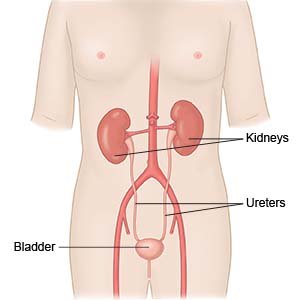Cystoscopy
Medically reviewed by Drugs.com. Last updated on May 6, 2024.
What do I need to know about a cystoscopy?
A cystoscopy is a procedure to look inside your urethra and bladder using a cystoscope. A cystoscope is a small tube with a light and magnifying camera on the end. The procedure is used to diagnose and treat conditions of the bladder, urethra, or prostate. Your healthcare provider may also do a ureteroscopy during a cystoscopy. A ureteroscopy is a procedure to look inside your ureters and kidneys.
 |
How do I prepare for a cystoscopy?
Your healthcare provider will talk to you about how to prepare for your procedure. He or she will tell you what medicines to take or not to take on the day of your procedure. You may need to stop taking medicines such as anticoagulants, aspirin, and ibuprofen several days before your procedure. Your provider may tell you stop eating after midnight the night before your procedure. You may be asked to drink a large amount of liquids before your procedure. Arrange for a ride home after your procedure. You will not be allowed to drive yourself home.
What will happen during a cystoscopy?
- You may be given general anesthesia to keep you asleep and pain free during your procedure. Your healthcare provider may instead use local anesthesia. It is put into your urethra and bladder. You will not feel pain, but you may be able to feel some pressure during your procedure. With local anesthesia, you may feel burning or need to urinate when the cystoscope is put in and removed.
- The cystoscope will be placed through your urethra and into your bladder. The urologist will look at the walls of your urethra as the scope goes through to your bladder. Your bladder will be filled with liquid so your urologist can see the inside of your bladder more clearly. Tools may be inserted through the cystoscope to treat any problems in your urethra or bladder. Your provider may also take a sample of tissue and send it to a lab for tests.
What will happen after the cystoscopy?
After you are fully awake, you will go home. You may see small amounts of blood in your urine. This is normal. It is also normal to have an increased need to urinate. You may also have burning or mild discomfort in your bladder or kidney area when you urinate. If you had general anesthesia, it may take at least 24 hours before you feel like your usual self.
What are the risks of a cystoscopy?
You may bleed more than expected or develop an infection. Your urethra, bladder, or ureters may get damaged during your procedure. You may have abdominal pain. Swelling caused by the cystoscopy may cause a blockage or slow urine flow.
Care Agreement
You have the right to help plan your care. Learn about your health condition and how it may be treated. Discuss treatment options with your healthcare providers to decide what care you want to receive. You always have the right to refuse treatment. The above information is an educational aid only. It is not intended as medical advice for individual conditions or treatments. Talk to your doctor, nurse or pharmacist before following any medical regimen to see if it is safe and effective for you.© Copyright Merative 2024 Information is for End User's use only and may not be sold, redistributed or otherwise used for commercial purposes.
Further information
Always consult your healthcare provider to ensure the information displayed on this page applies to your personal circumstances.
